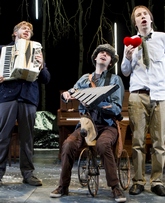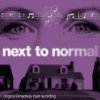SITE GUIDE
SEARCH
REVIEWS
REVIEW ARCHIVES
ADVERTISING AT CURTAINUP
FEATURES
NEWS
Etcetera and
Short Term Listings
LISTINGS
Broadway
Off-Broadway
NYC Restaurants
BOOKS and CDs
OTHER PLACES
Berkshires
London
California
New Jersey
DC
Connecticut
Philadelphia
Elsewhere
QUOTES
TKTS
PLAYWRIGHTS' ALBUMS
LETTERS TO EDITOR
FILM
LINKS
MISCELLANEOUS
Free Updates
Masthead
A CurtainUp Review
Three Pianos
By Elyse Sommer
|
Tonight I'll sing you a cycle of frightening songs. I'm curious to see what you'll
say to them. They've taken more out of me than any of the other songs..— Franz Schubert's amazing output included nearly seven hundred songs. Rick-as-Franz Schubert, on the 24 songs (his total song output added up to nearly 700) comprising Wintereisse, the masterwork composed during the final year of his brief life that is at the heart of Three Pianos. Every night when I go to bed, I hope that I may never wake again, and every morning renews my grief.— Franz Schubert. |

Dave Malloy, Alec Duffy, Rick Burkhardt
(Photo: Joan Marcus) |
Besides being hard to classify, Three Pianos may seem like an unlikely offering to open during the season associated with joyful good cheer. After all, there's more to be teary than cheery about in Franz Schubert's personal life. He died of syphillis at 31 and famously declared "every night when I go to bed, I hope that I may never wake again, and every morning renews my grief." Winterreisse,, which musicalized Wilhelm Müller's poem about a suicidal man's wanderings through a physically and emotionally frozen landscape, isn't a barrel of laughs either.
But don't rush off to Elf or The Radio City Christmas Spectacular just yet. Rick Burhardt, Alec Duffy, and Dave Malloy who wrote and arranged Three Pianos, are also its stars and, as already mentioned, they are at home in both the world of classical music and theater. And so this show is a merger of their talents and interests that has transformed the somber Schubert song cycle into a combination dramatized history lesson, rambling discussion and a concert that's not afraid to a touch of stylistic mash-up to a revered classical score a stylistic mash-up.
With the audience plied with wine both before and during the show, Schubert aficionados will quickly see that what this talented trio has done is to create their own Schubertiade. That's a type of event that began during Schubert's own lifetime and that has continued as a very special kind of musical celebration. Initially Schubert was very much present at these Schubertiads as he loved playing his music with friends. Since his friends were mostly poets and artists there would be readings of new poems as well as Schubert playing the latest of the nearly 700 songs he produced. There'd also be plenty of talk and drinking. While Wilhelm Müller the Wintereisse never attended these gatherings, two who he not only collaborated with but at various times lived with included Alex Mayrhofer and Franz von Schober with whome he was so close that they often used the portmanteau name of Schobert.
And so, while Burkhardt, Duffy and Malloy haven't invented the concept of throwing a musical party with musical performance and poetry readings, I doubt if even the most avid Schubertians have ever attended a Schubert-centric event like Three Pianos. While this Schubertiad has a distinctly vaudevillian flavor and Schubert might be amazed to hear the treatment given some of his songs, this is very much a tribute to the composer, starting with the strains of "Gute Nacht" and ending with the cycle's final song — so fully and gorgeously rendered that people unfamiliar with Winterreisse are likely to get a recording for future listening.
With the three performers moving from present to past and back, between their personal personas and problems and those of Schubert and some of his friends and the wide ranging discussions (subjects covered include what's involved in composing, whether poems were always written to be sung, how composers dealt with the realities of having their work published and performed), don't expect all the Winterreisse songs to be sung or played on the upright pianos that serve as the show's main scenic props. Some are dealt with as snippets, some are disposed of with dialogue. Nevertheless the 24 songs are the framework for everything that happens on stage. The three men come on stage to explore the Winterreise's textual meaning and musical but given the party set-up, the scholarly intent ends up often playing second fiddle to the Shubertiad party spirit. Which explains why you're seeing this at a downtown theater known for its often cutting edge work rather than in a concert hall.
Don't be fooled by the improvisatinal feel of the piece. Director Rachel Chavkin has helped Burkhardt, Duffy and Malloy to structure Three Pianos as carefully as the song cycle being analyzed. Andreea Mincic's set design which includes some stunning illustrations projected on a tablecloth draped over one of the pianos is wonderfully theatrical with its eerie graveyard, a doll house village for the Winterreise's wanderer (evocatively lit by Austin R. Smith). Besides, the generously offered bottles of wine to heighten the sense of the audience being part of a Schubertiad at a Vienna salon, there are also two chandeliers above the seating area.
One big misstep in the physical production is the hanging frame on which the song titles are projected. Unless you sit in the right side of the theater, you're not going to be able to read them -- so it's a good idea to keep the program open to the song list. At 2 hours (actually a bit more) without an intermission, Three Pianos could use some trimming, especially in the beginning since it takes a while to get into the concept of three friends getting together to honor and better understand the great composer. There's also some overkill to the moving around of those pianos. That said, this is one of the most unusual approaches to serious music as theater. To see how Rick, Alec and Dave actually put their very own spin on some of Schubert's songs, you might want to check out this YouTube link to their jazzy version of song # 15 Die Krahe .
|
Three Pianos Written, Arranged and Performed by Rick Burkhardt, Alec Duffy and Dave Malloy. Directed by Rachel Chavkin Scenic Design: Andreea Mincic Costume Design: Jessica Pabst Lighting Design: Austin Smith Video Design: Dave Malloy Running Time: Approx 2 hours without intermission New York Theatre Workshop79 E. 4th St. (2nd Av/Bowery) Reviewed by Elyse Sommer at December 18th press matinee |
|
REVIEW FEEDBACK Highlight one of the responses below and click "copy" or"CTRL+C"
Paste the highlighted text into the subject line (CTRL+ V): Feel free to add detailed comments in the body of the email. . .also the names and emails of any friends to whom you'd like us to forward a copy of this review. Visit Curtainup's Blog Annex For a feed to reviews and features as they are posted add http://curtainupnewlinks.blogspot.com to your reader Curtainup at Facebook . . . Curtainup at Twitter Subscribe to our FREE email updates: E-mail: esommer@curtainup.comesommer@curtainup.com put SUBSCRIBE CURTAINUP EMAIL UPDATE in the subject line and your full name and email address in the body of the message. If you can spare a minute, tell us how you came to CurtainUp and from what part of the country. |

Slings & Arrows-the complete set
You don't have to be a Shakespeare aficionado to love all 21 episodes of this hilarious and moving Canadian TV series about a fictional Shakespeare Company






